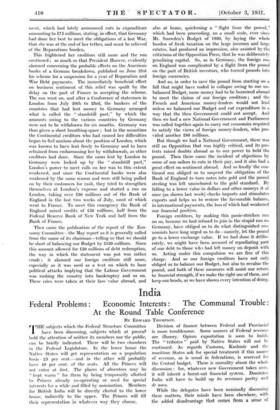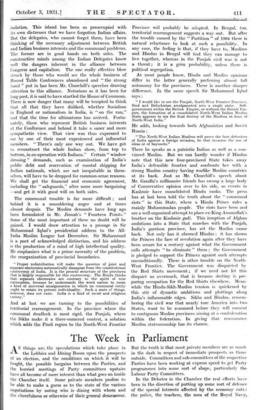India
Federal Problems : Economic Interests : The Communal Trouble : At the Round Table Conference
BY EDWARD THOMPSON.
FrHE subjects which the Federal Structure Committee have been discussing, subjects which at present hold the attention of neither its members nor the public, can be briefly indicated. There will be two chambers in the Federal Legislature.. In the lower house the Native States will get representation on a population basis— 25 per cent.—and in the other will probably have 40 per cent. of the seats. All the Princes will not enter at first.. The places of absentees may be " kept warm " for them by being temporarily allotted to Princes already co-operating or used for special interests for a while and filled by nomination. Members for British India will be directly elected to the lower house, indirectly to, the . upper. The Princes will fill their representation in whatever way they choose. Division of finance between Federal and Provincial is more troublesome. Some sources of Federal revenue are illusory. Opium exportation is soon to finish. The " tributes " paid by Native States will not he continued. As regards Customs, Kashmir and the maritime States ask for special treatment if this source of revenue, as is usual in federations, is reserved for the Central budget. There is unreality about the whole discussion : for, whatever new Government takes over, it will inherit a burnt-out financial system. Dominion India will have to build up its revenues pretty- well de novo.
While the delegates have been nominally discussing these matters, their minds have been elseWhere, with the added disadvantage that comes from a sense of isolation. This island has been so preoccupied with its own distresses that we have forgotten Indian affairs. But the delegates, who cannot forget them, have been thinking of the necessary adjustment between British and Indian business interests and the communal problems. The former are in good hands on both sides. The constructive minds among the Indian Delegates know well the dangers inherent in the alliance between Congress and capitalism. The one really effective blow struck by those who would see the whole business of. Round Table Conferences abandoned and " the strong hand " put in has been Mr. Churchill's speeches drawing attention to this alliance. Notorious as it has been for long past, it is said to have startled the House of Commons. There is, now danger that many will be tempted to think that all that they have disliked, whether, Socialism in England. or nationalism in India, is " on the run," and that the time for ultimatums has arrived. Fortu- nately, those who represent British business interests at the Conference and behind it take a saner and more sympathetic view. That view was thus expressed to me by, one of their most experienced and influential members. " There's only one way out. We have got to reconstruct the whole Indian show, from top to bottom, in co-operation with Indians." Certain " window dressing " demands, such as examination of India's public debt and reservation of coastal shipping for Indian nationals, which are not inequitable in them- selves, will have to be dropped for common-sense reasons. We shall get the financial and economic agreement, including the " safeguards," after some more bargaining —and get it with good will on both sides.
The communal trouble is far more difficult ; and behind it is a smouldering anger and at times almost despair. The Muslim demands have long ago been formulated in Mr. Jinnah's " Fourteen Points." Some of the most important of these no doubt will be gained. I would draw attention to a passage in Sir Muhammad Iqbal's presidential address to the All- India Muslim League last December. Sir Muhammad is a poet of acknowledged distinction, and his address is the production of a mind of high intellectual quality. He emphasizes what is a prime necessity of the problem, the reorganization of provincial boundaries.
" Proper redistribution will make the question of joint and separate electorates automatically disappear from the constitutional controversy of India. It is the present structure of the provinces that is laigely responsible for this controversy. The Hindu thinks that .separate electorates are - contrary to the spirit of true nationalism, because he understands the word nation to mean a kind of universal amalgamation in which no communal entity ought to retain its private individuality. Such a state of things, however, does not exist. India is a land of racial and religious variety."
And at last we are turning to the possibilities of territorial rearrangement. In the province where the communal deadlock is most rigid, the Punjab, where the Sikhs make it a three-cornered contest, a solution which adds the Pindi region to the North-West Frontier Province will probably be adopted. In Bengal, too, territorial rearrangement suggests a way _out. But after the trouble caused by the " Partition " of 1904 there is natural reluctance to look at such a possibility. In any case, the feeling is that, if they have to, Muslims and Hindus in Bengal will find they can manage to live together, whereas in the Punjab civil war is not a threat ; it is a grim probability, unless there is political segregation.
As most people know, Hindu and Muslim opinions differ in the latter generally preferring almost full autonomy for the provinces. There is another sharper difference. In the same speech Sir. Muhammad Iqbal says :.
" I would like to see the Punjab, North-West Frontier Province. Sind and Baluchistan amalgamated into a single state. Self- government within the British Empire, or without the British Ern- . pire, the formation of a consolidated North-West Indian Muslim State appears to me the final destiny of the Muslims at least of North-West India."
He adds, • looking towards both Afghanistan and Soviet Russia : - " The North-West Indian Muslims will prove the best defenders of India against a foreign invasion, be that invasion the one of ideas or of bayonets."
There he speaks as a patriotic Indian as well as a con- vinced Muslim. But we can hardly wonder if Hindus note that this new four-provinced State takes away India's defensible frontier and confronts . her with a strong Muslim country having warlike Muslim countries at its back. Just as Mr. Churchill's speech about Mr. Gandhi's millionaire friends has swung a large body of Conservative opinion over to his .side, so events in Kashmir have consolidated Hindu ranks. The press has at last been told the truth about the " communal riots " in this State, where a Hindu Prince rules a mainly Muhammadan people. The riots have been and are a well-organized attempt to place ex-King Amanullah's brother on the Kashmir gadi. This irruption of Afghan ambitions into a State that marches with the Punjab, India's garrison proVince, has 'set the Muslim cause back. Not only has it alarmed Hindus ; it has shown the Princes the face- of revolution again after they have been secure for a century against what the Government calls attempts " to eliminate " them ; the Government is pledged to support the Princes against such attempts unconditionally. There is other trouble on the North- West Frontier. The Government was disquieted' by the Red Shirts movement ; if we need not let this disquiet us overmuch, that is becauk 'destiiiY is pre- paring occupation for the Red Shirts 'elsewhere. Meati-. while the Hindu-Sikh-Muslim tension is quickened by this stir of dynastic ambitions and plottings along India's inflammable edges. Sikhs and Hindus, remeni- Bering the civil -war that nearly -tore America into two States, want - to be reassured before they will consent to contiguous Muslim provinces aiming at a confederation within the federation. In giving that reassurance Muslim statesmanship has its chance.











































 Previous page
Previous page